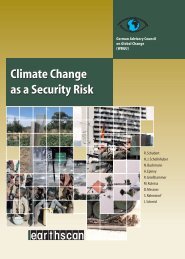Adaptation of water resources management to climate change
Adaptation of water resources management to climate change
Adaptation of water resources management to climate change
Create successful ePaper yourself
Turn your PDF publications into a flip-book with our unique Google optimized e-Paper software.
ADAPTATION OPTIONS FOR SOUTHERN AFRICAA number <strong>of</strong> institutions are working in Southern Africa <strong>to</strong> lessen the impacts <strong>of</strong> <strong>climate</strong> <strong>change</strong> bystrengthening disaster preparedness efforts. Participants at the Regional Dialogue on Climate Change,Water and Wetlands in Southern Africa, identified a number <strong>of</strong> technical, financial and socio-economicoptions <strong>to</strong> improve the adaptive capacity <strong>of</strong> the region <strong>to</strong> <strong>climate</strong> <strong>change</strong>. Some <strong>of</strong> the optionsidentified include improved forecasting, retr<strong>of</strong>itting infrastructure with additional safety features,increasing <strong>water</strong> s<strong>to</strong>rage capacity, instituting <strong>water</strong> demand <strong>management</strong>, implementing <strong>water</strong>reclamation, and supporting flood and drought insurance.Tackling the challenge <strong>of</strong> <strong>climate</strong> <strong>change</strong> provides a new opportunity for collaboration andpartnership, since none <strong>of</strong> the countries has the <strong>resources</strong> or capacities <strong>to</strong> adapt successfully on itsown. Participants at the Regional Dialogue recommended that a "network <strong>of</strong> champions" be createdin Southern Africa <strong>to</strong> support and drive a new regional initiative on adaptation. Institutions thatshould be included in the network include river basin commissions and committees, the SouthernAfrican Development Community, national committees on <strong>climate</strong> <strong>change</strong>, wetlands and <strong>water</strong>, theGlobal Water Partnership, IUCN The World Conservation Union, and Global Legisla<strong>to</strong>rs for a BalancedEnvironment (GLOBE). The main tasks <strong>of</strong> this network would be <strong>to</strong> raise public and political awarenessfor incorporating <strong>climate</strong> <strong>change</strong> in<strong>to</strong> <strong>water</strong> and wetland resource planning and <strong>management</strong>.EXPERIMENTING WITH ALTERNATIVE APPROACHES TO WATER RESOURCESALLOCATION INCREASES YIELDS IN ANDRA PRADESH.In Andra Pradesh, India, experiments growing paddy rice with a minimum amount <strong>of</strong> <strong>water</strong> duringdry years has resulted in an overall reduction <strong>of</strong> <strong>water</strong> demand by farmers. Traditionally, no cropsare grown in the irrigation tank command areas before the tanks are half-full <strong>of</strong> <strong>water</strong>, which usuallyhappens <strong>to</strong>wards the end <strong>of</strong> August. This is in spite <strong>of</strong> the fact that enough soil moisture would beavailable in the command areas earlier. Experimentation with early deep seeding and weeding inJune demonstrated that under specific conditions a crop can be grown with considerably less <strong>water</strong>.The experience has important implications for <strong>management</strong> <strong>of</strong> the command area during dry yearswhen not enough <strong>water</strong> would be available in the tanks and reservoirs. Using the new techniqueallows the entire command area <strong>to</strong> receive supplemented irrigation during the critical floweringand yield formation periods. Experiments carried out during a drought showed that though theyields per hectare would decrease by about 10 percent, the <strong>to</strong>tal yield in the command area wouldincrease by as much as 50%. These types <strong>of</strong> experiments will need further support if societies are <strong>to</strong>adapt <strong>to</strong> <strong>change</strong>s in the hydrological cycle due <strong>to</strong> <strong>climate</strong> <strong>change</strong>. 4044


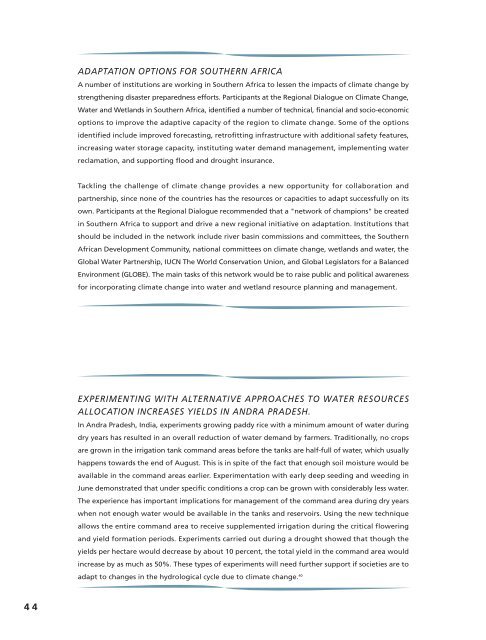
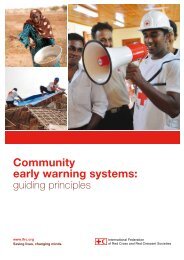
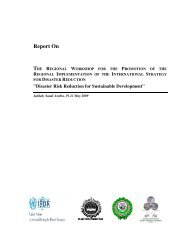
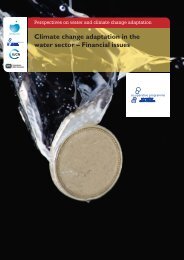
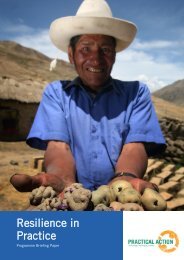
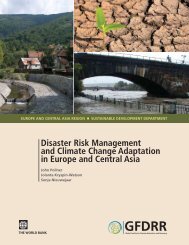
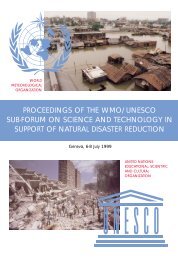

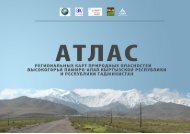
![View full document [PDF 988.55 KB] - PreventionWeb](https://img.yumpu.com/47733942/1/184x260/view-full-document-pdf-98855-kb-preventionweb.jpg?quality=85)
![View full document (in French) [PDF 4.96 MB] - PreventionWeb](https://img.yumpu.com/47223870/1/184x260/view-full-document-in-french-pdf-496-mb-preventionweb.jpg?quality=85)

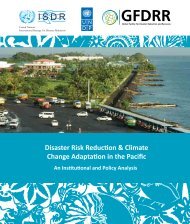
![View full document [PDF 25.02 MB] - PreventionWeb](https://img.yumpu.com/44204570/1/190x234/view-full-document-pdf-2502-mb-preventionweb.jpg?quality=85)
